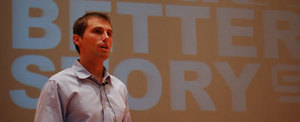Recycled fiber creating manufacturing jobs in the U.S., says entrepreneur
Published: November 2, 2011 / Author: Ed Cohen

It’s been a rule of life in U.S. manufacturing for decades, especially among clothing manufacturers: When jobs move overseas, they don’t come back.
Finally, they are. At least in a small way
SustainU, founded in 2009 by former Notre Dame football player – and later fashion model – Chris Yura, is contracting with surviving factories in the depressed former textile belt of the South to make T-shirts, polos and hoodies from 100 percent recycled fiber.
In a talk November 1, 2011, to students in the Entrepreneurial Insights course of Notre Dame’s Mendoza College of Business, Yura said sales grew from about 10,000 shirts during the company’s first year to about 250,000 in 2010. He said he expects that total to double or triple this year.
SustainU employs 15 people directly, he said, but “indirectly, though our partnerships, we have about 450 people working for us on a day-to-day basis.”
SustainU makes blank garments in various colors that can then be finished with clients’ logos or other designs. The majority of its customers have been universities, but the company also has sold to the Boy Scouts of America and to six NASCAR tracks, he said.
SustainU products have multiple selling points. They’re all made in America, so they save or create jobs. And they’re environmentally friendly. That resonates especially with “sustainability directors” at the more than 150 universities with which SustainU has done business, he said.
The recycled material – made mostly from plastic bottles and scrap cotton from textile-factory floors – is said to be eco-friendly because it saves the water needed to grow and process new cotton, among other efficiencies. (The recycled material feels like regular cotton or cotton-blend, he said.) Also, everything SustainU makes is locally sourced. Creation of the yarn, knitting the fabric, and cutting and sewing the garments all takes place within a 200-mile radius, he said. The company contracts with four factories in North Carolina and Tennessee.
Most textile manufacturing left the United States because of lower labor costs in other countries. Yura said SustainU’s direct and indirect employees are paid a living wage and benefits. Yet its products are priced the same or cheaper than comparable products made overseas from new material, he said.
The CEO said his company benefits from partnerships that reduce overhead, such as contracting out the manufacturing rather than owning factories. In an interview after his talk, Yura also mentioned that he doesn’t seek profit margins as large as his competitors.
“I’m looking to have enough to pay my employees, pay health insurance, make a decent wage,” he said. “I’m not trying to be the next millionaire. I’m just trying to employ people.”
Yura told the entrepreneurship students that manufacturing in the United States is gaining in appeal because of rising energy costs for shipping goods and because of supply-chain complications. Sometimes those involve re-relocating manufacturing to find lower labor. He said some Chinese companies are building factories in the lower-wage Dominican Republic now because Chinese workers are demanding better pay.
“It’s getting closer and closer to coming back to the United States,” he said of manufacturing.
Yura, 30, earned a bachelor’s degree in sociology and computer applications while lettering all four years as a fullback and special teams player on the Notre Dame football team. After graduating in 2003, he was working as a trainer at the fitness center of the Four Seasons luxury hotel in Miami when the local newspaper, doing a story on the center, asked him to pose for a photo, he said. The photo was noticed by a modeling talent scout who recruited him to New York City. He worked there five years, he said.
While modeling, he said, he began to learn about the apparel industry. He eventually decided he wanted to start a company, but he wanted to make it about more than just apparel, he said. He wanted it to serve a social good.
He moved back in with his parents in Morgantown, W.Va. Both were psychology professors at West Virginia University. They agreed to help finance the launch of SustainU by taking out a third mortgage on their house, he said.
The company started production in a knitting mill in tiny Lincolnton, N.C., that had only three employees, he said. All the rest had been laid off.
“That first year we were able to grow to fill that entire factory of 30 workers. That means 27 came off of unemployment to work in the factory, which was really cool,” he said. “We were super pumped because the goal and the mission of the business is to create jobs and to create awareness of sustainable materials like recycled fiber.”
Entrepreneurial Insights is a fall lecture series and course of Notre Dame’s Gigot Center for Entrepreneurial Studies. It features entrepreneurs, investors, innovators and business leaders who offer their experience and advice in areas critical to the creation of new ventures, the ongoing viability of existing business, economic growth, and the betterment of society. For more information about the series or the Gigot Center visit http://business.nd.edu/gigot_center/
/news_and_events/news_articles/article/10280/recycled-fiber-creating-manufacturing-jobs-in-the-u-s-says-entrepreneur




